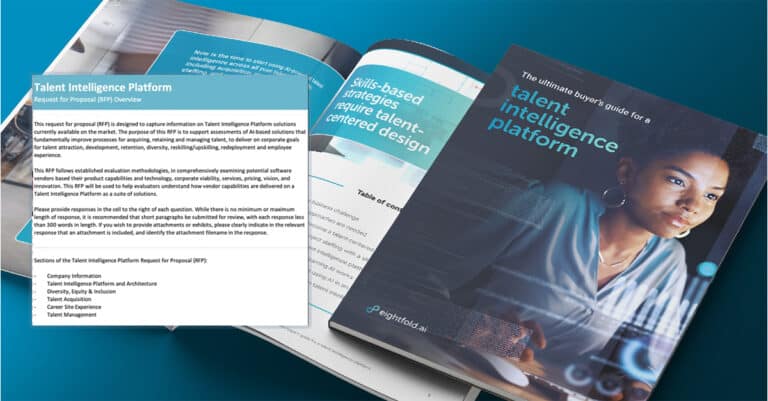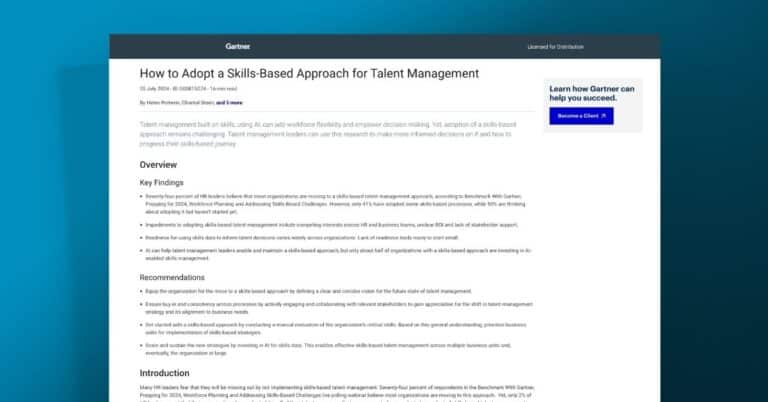Talent management built on skills, using AI, can add workforce flexibility and empower decision making. Yet, adoption of a skillsbased approach remains challenging. Talent management leaders can use this research to make more informed decisions on if and how to progress their skills-based journey.
Key findings:
- Seventy-four percent of HR leaders believe that most organizations are moving to a skills-based talent management approach, according to Benchmark With Gartner, Prepping for 2024, Workforce Planning and Addressing Skills-Based Challenges. However, only 41% have adopted some skills-based processes, while 50% are thinking about adopting it but haven’t started yet.
- Impediments to adopting skills-based talent management include competing interests across HR and business teams, unclear ROI and lack of stakeholder support.
- Readiness for using skills data to inform talent decisions varies widely across organizations. Lack of readiness leads many to start small.
- AI can help talent management leaders enable and maintain a skills-based approach, but only about half of organizations with a skills-based approach are investing in AI-enabled skills management.
Gartner, How to Adopt a Skills-Based Approach for Talent Management, Helen Poitevin, Chantal Steen, Travis Wickesberg, Emi Chiba, LauraGardiner, Hiten Sheth, and Colleen Malley, 25 July 2024.
GARTNER is a registered trademark and service mark of Gartner, Inc. and/or its affiliates in theU.S. and internationally and is used herein with permission. All rights reserved.
Talent management built on skills, using AI, can add workforce flexibility and empower decision making. Yet, adoption of a skillsbased approach remains challenging. Talent management leaders can use this research to make more informed decisions on if and how to progress their skills-based journey.
Key findings:
- Seventy-four percent of HR leaders believe that most organizations are moving to a skills-based talent management approach, according to Benchmark With Gartner, Prepping for 2024, Workforce Planning and Addressing Skills-Based Challenges. However, only 41% have adopted some skills-based processes, while 50% are thinking about adopting it but haven’t started yet.
- Impediments to adopting skills-based talent management include competing interests across HR and business teams, unclear ROI and lack of stakeholder support.
- Readiness for using skills data to inform talent decisions varies widely across organizations. Lack of readiness leads many to start small.
- AI can help talent management leaders enable and maintain a skills-based approach, but only about half of organizations with a skills-based approach are investing in AI-enabled skills management.
Recommendations:
- Equip the organization for the move to a skills-based approach by defining a clear and concise vision for the future state of talent management.
- Ensure buy-in and consistency across processes by actively engaging and collaborating with relevant stakeholders to gain appreciation for the shift in talent management strategy and its alignment to business needs.
- Get started with a skills-based approach by conducting a manual evaluation of the organization’s critical skills. Based on this general understanding, prioritize business units for implementation of skills-based strategies.
- Scale and sustain the new strategies by investing in AI for skills data. This enables effective skills-based talent management across multiple business units and, eventually, the organization at large.
Talent management leaders feel they need to do something, but are unsure of where to start or what to do. Plus, the scope of skills-based talent management is not wellestablished, leading to confusion.
We see evidence grounded in progressive practice and organizational performance indicators that a few early adopters of skills-based approaches have become more nimble, with an ability to respond more quickly and adeptly to volatile market conditions. This is part of what makes skills-based talent management attractive to many HR leaders. At the same time, the move to skills-based talent management takes time and effort, requiring planning, coordination, and the right data and technology to support it.
Talent management leaders interested in a skills-based approach should follow these steps to begin their shift:
- Define their vision of the future skills-based state
- Collaborate with stakeholders to build buy-in
- Collect skills data and prioritize areas for implementation
- Invest in technology to scale and maintain the new strategy











